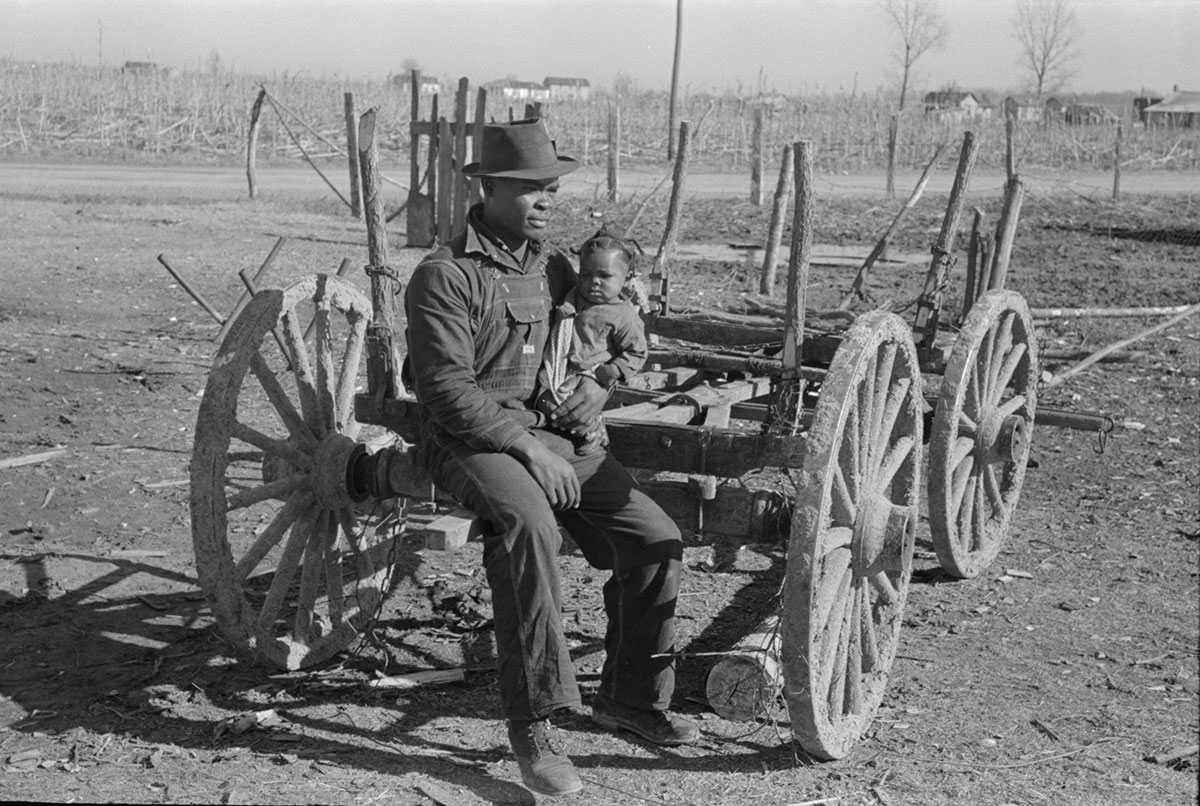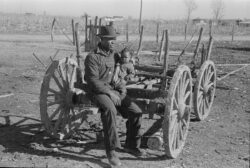Louisiana Farmers’ Union
An interracial organization formed at the height of the Great Depression, the Louisiana Farmers’ Union sought to provide assistance to Louisiana farmers.

Library of Congress
Louisiana sharecropper with child, 1939. Lee Russell, photographer.
The Louisiana Farmers’ Union (LFU) was an interracial organization formed at the height of the Great Depression to provide assistance for Louisiana farmers. Although relatively short-lived, the LFU inspired future political activism that found expression in the struggle for civil rights.
The Great Depression devastated the US economy. The country’s most vulnerable citizens—those already struggling on the margins of solvency—felt the financial strain most acutely. In particular sharecroppers, tenant farmers, and other threatened communities in hard-hit rural areas faced ruin from the economic cataclysm. Confronted with a dire future, many recognized the need for collective action. In 1931 the communist, Alabama-based Sharecroppers’ Union (SCU) garnered attention in the staunchly conservative and segregated state by creating an interracial organization with a rapidly expanding membership. As SCU successes mounted, the group faced a ferocious backlash that forced it into hiding and convinced union leaders to look to neighboring states, where the racial climate might prove less caustic, to continue their efforts.
In 1936 the SCU relocated to a new home in New Orleans. The Louisiana Farmers’ Union, under the leadership of former SCU organizer Clyde Johnson, emerged out of what remained. With a handful of operatives already on the ground in the Pelican State, the LFU initially flourished as it offered the prospect of fair compensation to impoverished workers in the state’s cotton- and sugar-producing districts. Several factors accounted for the short-term success of the union in Louisiana. Notably, Black women, who had higher literacy rates than Black men, proved critical in composing and disseminating union information, while also pushing for equal pay and pregnancy-related labor safeguards. The New Deal’s sympathetic view of organized labor helped spur nationwide unionization efforts that attracted many marginalized Americans to their ranks, offering a sense of empowerment through collective action. Although most New Deal programs funneled resources to state authorities, the state often failed to dispense federal money equitably. Critical funding, even if only in small amounts, did find its way to impoverished Louisianans, offering a much-needed lifeline. Similarly, efforts to combat the Great Depression generated federal efforts to remake the South, starting with its large impoverished population mired in rural poverty. In turn, promises of federal money and protection prompted further union organizing. LFU activists such as Reuben Cole and Peggy Dallet spearheaded overtures to poor white Louisiana farmers, often using local churches as recruitment centers. Similarly, African American recruiter proved especially adept at convincing struggling Black farm workers to consider union membership despite the obvious risk such a step posed in Jim Crow Louisiana. He recruited poor Black farmers and sharecroppers across the state, putting himself in considerable danger along the way.
In 1937 the LFU was formally chartered into the National Farmers’ Union. Although it briefly flirted with forming a single integrated union, the LFU’s new head Gordon McIntire determined that challenging Jim Crow was not in the organization’s best short-term interests, considering the volatile climate of race relations across the South. The group established a system of segregated local chapters within the context of the larger biracial union. Despite concessions to the racial status quo, efforts to unionize in southeast Louisiana were met with fierce opposition and yielded limited gains. In part the LFU faced strong resistance because it attempted to bring poor Black and white people together based on their common economic plight, and its clear communist moorings rankled area conservatives. Likewise important, however, was the threat posed by any agricultural union to the state’s planter elites, who utilized every trick at their disposal to undermine farm cooperatives. Violence and intimidation proved typical as union initiatives across South Louisiana faced a ferocious white supremacist backlash. Although it reached a peak membership of around 3,000 individuals in 1940, the organization soon collapsed owing to ongoing persecution, the absence of stable revenue, and the economic boost brought by mobilization for World War II. By the end of 1941, the National Farmers’ Union suspended the LFU’s charter due to its financial woes.
Despite the short lifespan of the organization, the LFU served the crucial purpose of politicizing many Louisianans, especially Black workers, as it provided an opportunity to consider the power of collective action. Its legacy of activism proved important in the 1950s and 1960s as the grassroots struggle for civil rights blossomed. Many former LFU members joined the Congress of Racial Equality and other groups that directly challenged Jim Crow ordinances across the state. Although it was of relatively minor significance in its time, the Louisiana Farmers’ Union left behind a legacy of grassroots activism that profoundly influenced the later civil rights movement.
